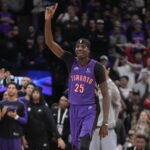
The Toronto Raptors have a solid young core, with Scottie Barnes, RJ Barrett, and Immanuel Quickley all being 25 or younger. The Raptors also have a decent veteran group headlined by Bruce Brown, Kelly Olynyk, and Chris Boucher. With Toronto prioritizing player development this season, should the Raptors turn to their veteran group for guidance and mentorship or as a way to gain future assets?
The Value of the Raptors Veteran Group
Kelly Olynyk
One of the Raptors’ first moves this offseason was resigning Olynyk to a two-year $26 million extension. However, 18 games into the season, Olynyk has yet to suit up with a back injury keeping him sidelined. At 6’11, Olynyk offers a valuable skillset off the bench, being able to space the floor at the five and help run an offense system with his playmaking. Two skills teams can never get enough of. Olynyk’s contract is also pretty tradeable, only making $12.8 million this season and $13.4 million next.
The team has said the injury keeping Olynyk in street clothes isn’t severe, but after missing 18 straight games, it leaves questions about the severity of the injury. While Toronto could probably find a team at the deadline needing another big body and shooting, the value you’re getting back in a trade is probably less than what a healthy Olynyk can bring. With his shooting, Olynyk allows Toronto to experiment with lineups featuring multiple non-shooters on the wings. Toronto could also use him to help facilitate jumbo lineups that feature Barnes, Barrett, Jonathan Mogbo, and Ochai Agbaji as the secondary playmaking behind Barnes.
Bruce Brown
Like Olynyk, Brown has been sidelined all season, recovering from offseason knee surgery. However, Brown has been cleared for full contract and is in the process of ramping up to play. An additional guard will be a welcome sight for the Raptors, who have been without their starting PG Quickley for most of the season. While Davion Mitchell and Jamal Shead have done their best filling in for Quickley, they lack the scoring ability to pressure defenses yet. Brown has that ability with his slashing/cutting and activity on the offensive glass. Those traits, mixed with Brown’s defensive ability and playmaking, make him a valuable player on almost any team.
However, again, like Olynyk, with Brown’s price tag and fresh-off surgery, any value the team can find for him on the market probably won’t equal what he can bring to the team. Even with that, unless Toronto is looking to keep Brown long-term, they should still look to move him. Mitchell and Shead are younger, will be cheaper, and better line up with the rest of the roster’s timeline. Keeping Brown around may bring immediate improvement, but the short-term gains don’t outweigh the potential long-term returns of developing Mitchell and Shead.
Chris Boucher
After failing out of Darko Rajakovic’s rotation last season, Boucher has been a staple of this year’s bench. Boucher leads Toronto’s bench in scoring, rebounding, blocks, and minutes per game. He has been crucial for the Raptors all season. While Boucher is producing reasonably well, he is also soon to be 32 and is in the final year of his contract. It doesn’t seem likely that Toronto will bring him back next season, considering his age and how many young players on the roster need minutes.
Unlike Brown or Olynyk, who are either expensive or under contract longer, Boucher is on a cheap $10.8 million expiring deal. With his production/size and deal, Boucher could get a decent return in a trade. While losing the last member of the 2019 championship team would hurt, he will be gone soon anyway, so might as well get something in return. The Raptors bench will be worse without him, but in a year where the team wants to bottom out, that’s not bad.
The post The Value of the Raptors Veteran Group appeared first on Last Word On Basketball.